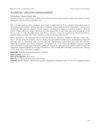 53 citations,
September 2014 in “Reproductive Biology and Endocrinology”
53 citations,
September 2014 in “Reproductive Biology and Endocrinology” Different types of PCOS have different levels of metabolic problems, with the most severe type showing the highest disturbances.
 4 citations,
June 2006 in “Primary Care”
4 citations,
June 2006 in “Primary Care” The document recommends a team-based approach and personalized care for managing diabetes in teenagers.
December 2022 in “Journal of Sulaimani Medical College” Sleeve gastrectomy leads to significant weight loss and health improvements with few complications.
 2 citations,
September 2021 in “Cutis”
2 citations,
September 2021 in “Cutis” Eating shiitake mushrooms caused a man to develop a rash similar to a skin condition known as AGEP.
 May 2023 in “Journal of Investigative Dermatology”
May 2023 in “Journal of Investigative Dermatology” Blocking DPP4 can potentially speed up hair growth and regeneration, especially after injury or in cases of hair loss.
 11 citations,
December 2022 in “Arterial Hypertension”
11 citations,
December 2022 in “Arterial Hypertension” New guidelines stress early diagnosis and lifestyle changes to manage metabolic syndrome and prevent complications.
 September 2013 in “Neurodegenerative disease management”
September 2013 in “Neurodegenerative disease management” Teriflunomide is effective and generally safe for treating relapsing multiple sclerosis, reducing relapse rates and disability progression.
 42 citations,
November 2019 in “Frontiers in Endocrinology”
42 citations,
November 2019 in “Frontiers in Endocrinology” The document suggests creating a validated score to diagnose Cushing's Syndrome and considers plasma steroid profiling as a simpler diagnostic method.

N793 may improve hair density in people with mild hair thinning.
 58 citations,
June 2012 in “Journal of Alternative and Complementary Medicine”
58 citations,
June 2012 in “Journal of Alternative and Complementary Medicine” Citrullus colocynthis has pain-relieving, anti-inflammatory, antidiabetic, and hair growth benefits, but can cause side effects like colic and diarrhea.
 February 2020 in “Research Square (Research Square)”
February 2020 in “Research Square (Research Square)” Skin tags in obese individuals may indicate a higher risk of heart disease and diabetes.
 December 2014 in “Endocrinología y nutrición”
December 2014 in “Endocrinología y nutrición” The woman's rare combination of diseases suggests an unknown factor may predispose individuals to multiple endocrine diseases.
 August 2016 in “CRC Press eBooks”
August 2016 in “CRC Press eBooks” Before treating hair loss, it's crucial to diagnose and treat any underlying medical conditions that may be causing it.
 21 citations,
August 2016 in “Translational Andrology and Urology”
21 citations,
August 2016 in “Translational Andrology and Urology” Delayed ejaculation is a complex issue caused by psychological, biological, and lifestyle factors, requiring a holistic treatment approach.
 September 2023 in “International journal of women’s dermatology”
September 2023 in “International journal of women’s dermatology” Certain hairstyles, diabetes, scalp infections, and vitamin D deficiency may increase the risk of hair loss in Black women; more research is needed for better treatment.
 1 citations,
November 2022 in “Journal of the Endocrine Society”
1 citations,
November 2022 in “Journal of the Endocrine Society” Adults with classic congenital adrenal hyperplasia value medication that prevents weight gain from glucocorticoids the most.
 36 citations,
October 2021 in “Frontiers in Endocrinology”
36 citations,
October 2021 in “Frontiers in Endocrinology” Insulin resistance and high male hormone levels are major causes of Polycystic Ovary Syndrome.
 200 citations,
October 2009 in “European journal of endocrinology”
200 citations,
October 2009 in “European journal of endocrinology” Metformin helps manage polycystic ovary syndrome by improving insulin resistance and ovulation, but more research is needed on its full effects.
5 citations,
January 2020 in “Research journal of pharmacy and technology” CBD may help reduce stress and pain in women with PCOS.
 124 citations,
June 2002 in “Best Practice & Research Clinical Endocrinology & Metabolism”
124 citations,
June 2002 in “Best Practice & Research Clinical Endocrinology & Metabolism” Polycystic Ovary Syndrome likely starts in childhood and may be genetic and influenced by early hormone exposure.
 June 2024 in “Bangladesh Journal of Medicine”
June 2024 in “Bangladesh Journal of Medicine” Effective alopecia treatment depends on the specific cause and includes medications and procedures.
 16 citations,
November 2018 in “Singapore Medical Journal”
16 citations,
November 2018 in “Singapore Medical Journal” Primary care for PCOS focuses on lifestyle changes, medication based on symptoms, and mental health, with diabetes screening and specialist referral for severe cases.
 1 citations,
April 2021 in “Undergraduate Research in Natural and Clinical Science and Technology (URNCST) Journal”
1 citations,
April 2021 in “Undergraduate Research in Natural and Clinical Science and Technology (URNCST) Journal” PCOS can harm heart health by increasing risks like high blood pressure and diabetes, but treatments like birth control and lifestyle changes can help.
 January 2015 in “Springer eBooks”
January 2015 in “Springer eBooks” The document concludes that managing PCOS involves lifestyle changes, medication, and monitoring for associated health risks.
 1 citations,
January 1996 in “Gynecological endocrinology”
1 citations,
January 1996 in “Gynecological endocrinology” Non-invasive imaging helped diagnose a woman's severe hormone imbalance and diabetes, and medication successfully treated her condition.
 January 2017 in “Open Journal of Endocrine and Metabolic Diseases”
January 2017 in “Open Journal of Endocrine and Metabolic Diseases” The document concludes that managing Dunnigan-Type Familial Partial Lipodystrophy involves treating associated health issues and using medications like metformin and leptin replacement.
 January 2016 in “Journal of clinical & experimental dermatology research”
January 2016 in “Journal of clinical & experimental dermatology research” New methods can diagnose hair loss by examining the scalp and can treat it with a mix of oral and topical medications, along with cosmetic procedures like hair transplants.
 August 2019 in “bioRxiv (Cold Spring Harbor Laboratory)”
August 2019 in “bioRxiv (Cold Spring Harbor Laboratory)” The model successfully predicted new uses for existing drugs, like using certain hormonal and heart medications for respiratory and Parkinson's diseases, and a cancer drug for diabetes.
January 2022 in “Dubai diabetes and endocrinology journal/Dubai diabetes & endocrinology journal” A 16-year-old girl with HAIR-AN syndrome was treated with lifestyle changes and medications to manage her condition.
 18 citations,
July 2001 in “Australian veterinary journal”
18 citations,
July 2001 in “Australian veterinary journal” A cat with skin bumps and itching had high blood fats and skin infections, which improved with diet and medication changes.


























